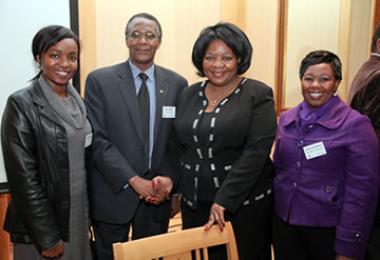Property Sector Charter forges ahead with full commitment of stakeholders and support of line ministry
 From left to right: Fundzo’s Nomvula Mdluli; Saul Gumede, Property Sector Charter Council chairman; Minister of Public Works, Gwen Mahlangu-Nkabinde; and Portia Tau-Sekati, Property Sector Charter Council CEO
From left to right: Fundzo’s Nomvula Mdluli; Saul Gumede, Property Sector Charter Council chairman; Minister of Public Works, Gwen Mahlangu-Nkabinde; and Portia Tau-Sekati, Property Sector Charter Council CEO
The Property Sector Charter Council on Friday 10th June hosted a seminar on the transformation in the property industry and the way forward – ahead of the gazetting of the sector charter – to ensure that the industry members understand the implications to the sector and business at large.
The property sector remains one of the key economic sectors in the South African economy, estimated at R4 trillion in total value (49% and 52% attributed to commercial and residential sectors, respectively).
“It is because of the recognition of the importance of transformation as a critical imperative for all South African economic sectors that the Property Sector Charter Council commits to strive for transformed property relations in South Africa and to promote a vibrant growing property sector,” said Portia Tau-Sekati, chief executive officer of the Property Sector Charter Council.
The Property Charter stakeholders including the public sector, property service providers, property owners, regulatory bodies and other interest groups participating in the private sector met to discuss progress made since the adoption of the Property Sector Transformation Charter.
It is expected that the Property Charter will unlock obstacles to property ownership and the effective participation of all South Africans in the property market.
“This seminar marks a major step in a process started many years ago by the late Minister of Public Works, Stella Sigcau,” said Saul Gumede, chairman of the Property Sector Charter Council.
“The road that has been travelled since the adoption of the Property Sector Transformation Charter in 2007 speaks volumes about our commitment and willingness to conclude the work of those who have come before us,” said Gumede.
Tau-Sekati said this seminar launches the education and awareness drive around the Property Charter and brings into effect the commitment and buy-in of support of transformation and empowerment by all signatories through the sector charter, by driving implementation in order to achieve key milestones and targets.
“The Property Sector Charter is only a guiding document of how transformation and empowerment could be achieved in the property sector. The true delivery and effects will be seen in the implementation of the charter by its stakeholders,” said Tau-Sekati.
Transformation remains a key delivery for the Minister of Public Works, Gwen Mahlangu-Nkabinde. “It is through the Property Sector Charter that as government – the single biggest property owner (with property holding of about R400 billion) and biggest tenant and client in the South African property sector – we become a major catalyst for change in property ownership.
We aim to promote the objectives contained in the BBBEE Act of enabling meaningful participation of black people including women, youth and people with disabilities to achieve sustainable development and general prosperity,” says Minister Mahlangu-Nkabinde.
Through its Ministry the Department of Public Works acknowledges its crucial role in the transformation of the property sector.
It realises that the success of the Property Sector Charter depends on the full co-operation and commitment of government departments and private sector organisations involved in the property sector.
“With the gazetting of the sector charter it means real work begins and the true measure will be how we successfully implement the charter in line with the following targets:
- Unlock obstacles of ownership and participation in the property market by black people
- Achieve a substantial change in racial and gender composition of ownership and control, whilst promoting employment equity, in order to encourage diverse organisational cultures
- Promote property development and investment in rural and under-resourced areas which enhances basic infrastructure, encourages investment and supports micro and small enterprises
- Create a platform to increase the pool of intellectual capital amongst black people, particularly women, in the sector by contributing towards increased investment in skills development and training of existing and new black professionals.
The aim of the seminar was also to establish how government could work with the private sector on initiatives that show clear commitment and concrete interventions that support empowerment aligned to the charter,” said Tau-Sekati.




















